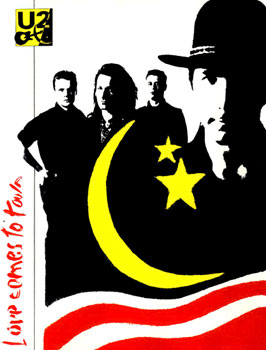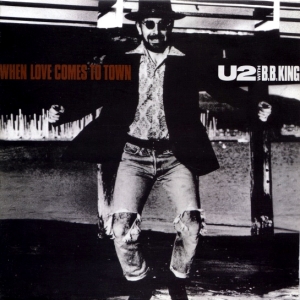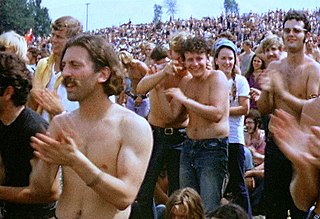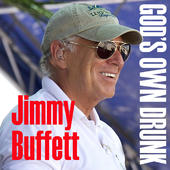
Applause is primarily a form of ovation or praise expressed by the act of clapping, or striking the palms of the hands together, in order to create noise. Audiences usually applaud after a performance, such as a musical concert, speech, or play, as a sign of enjoyment and approval.
Projekt Revolution was a music festival hosted by Linkin Park, bringing artists of various genres of music together. Linkin Park started Projekt Revolution in the year 2002 with just one stage. Then, in 2004, they announced the Revolution Stage where the smaller bands/artists would perform.

A set list, or setlist, is typically a handwritten or printed document created as an ordered list of songs, jokes, stories and other elements an artist intends to present during a specific performance.

The Lovetown Tour was a concert tour by the Irish rock band U2, which took place in late 1989 and early 1990 following the release of Rattle and Hum. It was documented by noted rock film director Richard Lowenstein in the "LoveTown" documentary.

"When Love Comes to Town" is a song by Irish rock band U2 featuring blues guitarist B.B. King. It is the twelfth track from U2's 1988 album, Rattle and Hum, and was released in 1989 as the record's third single. The song was recorded at the historic Sun Studio in Memphis. "When Love Comes to Town" reached number one in the Irish Singles Chart, number six in the UK Singles Chart, number ten in the Dutch Top 40, and number two in the US Mainstream Rock Tracks chart.

Pink Floyd's sound, lighting and other stage technology set standards in the music industry. The band developed innovative use of sound effects and panning quadrophonic speaker systems in live performances from the mid-1960s until their final concerts decades later, including use of immersive live visuals.

A Bigger Bang was a worldwide concert tour by the Rolling Stones which took place between August 2005 and August 2007, in support of their album A Bigger Bang. At the time, it was the highest grossing tour of all time, earning $558,255,524, before being surpassed by U2's 2009–11 U2 360 Tour, and eventually Taylor Swift's 2023–24 Eras Tour. The tour was chronicled on the video release The Biggest Bang, compiling full performances, several recordings from shows and documentaries. Notable concerts on the tour included a two-night stand in the autumn of 2006 at the Beacon Theatre filmed by Martin Scorsese for Shine a Light, and their half-time performance at Super Bowl XL.

Concert etiquette refers to a set of social norms observed by those attending musical performances. These norms vary depending upon the type of music performance and can be stringent or informal.
The Who Tour 2006–2007 was The Who's first worldwide concert tour since 1997, supporting their Endless Wire album.

"Take It to the Limit" is a song by the Eagles from their fourth album One of These Nights from which it was issued as the third single on November 15, 1975. It reached No. 4 on the U.S. Billboard Hot 100 and was also the Eagles' greatest success to that point in the UK, going to No. 12 on the charts. Billboard ranked it as the No. 25 song for 1976.

Live in Auburn is a live album by the American singer-songwriter Jimmy Buffett and is one of number of Jimmy Buffett sound board live albums recorded directly from the mixing console without further editing, thus resembling bootleg recordings.
The Purple Rain Tour was a concert tour by American recording artist Prince and The Revolution following up on the success of his sixth studio album Purple Rain and his 1984 film Purple Rain. According to Spin, the tour sold over 1.7 million tickets.
"Son of a Son of a Sailor" is a song written and performed by American popular music singer-songwriter Jimmy Buffett. It is the opening track of the 1978 album of the same name. The song is a fan favorite, although it was not a concert staple until the 2005 Salty Piece of Land tour.

The Liebe ist für alle da Tour was a concert tour by German band Rammstein that took place from 2009 through 2011, in support of their sixth studio album, Liebe ist für alle da. The tour consisted of six legs and took place in Europe, North America, South America, New Zealand, Australia and South Africa. During the tour, Rammstein would perform in the countries of Turkey and South Africa. The band would perform in the United States and Canada for the first time since their 2001 Mutter tour.

One on One was a concert tour by English musician Paul McCartney that began on 13 April 2016 and traveled through the United States, Canada, Argentina, Germany, France, Spain, the Netherlands, the Czech Republic, Norway, Denmark, Belgium, Japan, Brazil, Mexico, Australia and New Zealand, ending on 16 December 2017. The tour marked McCartney's first-ever performances in Fresno, South Dakota, and Arkansas. Prior to the announcement of the tour, McCartney revealed two European festival dates for June 2016 at the Pinkpop Festival and Rock Werchter respectively.

"God's Own Drunk" is a monologue by Lord Buckley that musicians have since adapted into different types of songs; most notably, Jimmy Buffett, who first recorded his rendition for Living and Dying in ¾ Time and has since released a digital download single of a live performance in 2011. Buffett's version was a concert staple and even regarded as his theme before "Margaritaville"'s popularity, until he was forced to stop playing it after being sued by Buckley's son, Dick Buckley Jr., for copyright infringement.

The Play That Song Tour was a concert tour by American pop rock band Train. It was in support of the group's tenth studio album, A Girl, a Bottle, a Boat (2017). The tour began on May 12, 2017, in Las Vegas and finished on October 25, 2017, in Belfast, Northern Ireland. Train announced the tour in January 2017.

The Resist Tour was a concert tour by Dutch symphonic metal band Within Temptation, in support of their seventh album Resist which was released on 1 February 2019. The tour began on 11 October 2018 in Krasnoyarsk, Russia, and visited seventeen countries in Europe. The supporting acts for the first leg were bands Beyond the Black and Ego Kill Talent. For 2019, the band toured North America alongside In Flames and performed at both select European summer festivals and special open air shows with selected guests. The band was scheduled to perform a second round of summer festivals in 2020, but due to the COVID-19 pandemic the festivals had to be cancelled.















